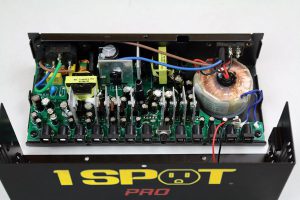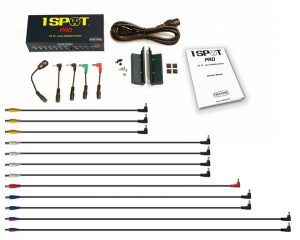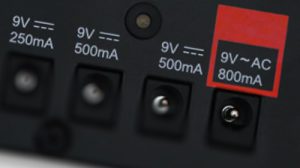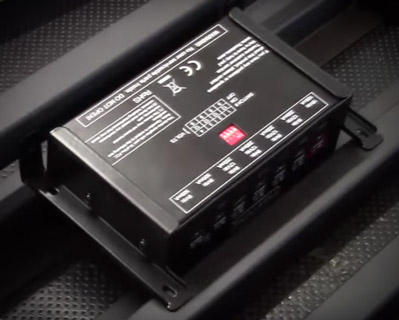TRUETONE 1 SPOT - Pro CS12
1 SPOT Technology

1 SPOT Technology… what does that mean and why should I care? Technically, it’s switching power supply technology, which is very different than what anyone has ever put inside a power brick. Normally, you would find just a big transformer and a handful of small electronic components inside a power brick… old tech that hasn’t changed in decades and has a lot of limitations. We took the same triple filtered switching power supply technology found in our famous 1 SPOT and scaled it up to make the 1 SPOT Pro models. With much more space to work with, we were able to completely eliminate noise, provide total electrical isolation between outputs, create multiple voltages, and still give you the ability to use it anywhere in the world.
A major benefit of using a switching power supply is that it can handle far more current (power being pulled out of it) than any transformer-based power supply. Although we had to put power rating labels on each output to satisfy certification agencies (yes, we actually certified these, unlike most companies), the outputs can generally handle far more than the label shows. For example, you can connect a 300mA pedal to a 200mA output, without causing any problems. With a transformer-based power supply, you can’t get away with that. The important thing is to not exceed the total of all the labels. With a CS7, the output labels add up to 1900mA total. That means the total current draw of all your pedals should be less than 1900mA. That total current rating is roughly double the current load of the most common power brick, for a lot less money.
1 SPOT Pro Comparison Chart

| Features | CS6 | CS7 | CS12 |
|---|---|---|---|
| Total Outputs | 6 | 7 | 12 |
| Maximum Total Current Output | 1600mA | 1900mA | 3000mA |
| Total 9Vdc Outputs | 6 | 6 | 9 |
| 9/12Vdc Outputs (switchable) | 2 | 4 | 4 |
| 9/18Vdc Outputs (switchable) | 2 | - | - |
| 18Vdc Outputs | - | 1 | 2 |
| 9Vac Outputs | - | - | 1 |
| Variable 4-9Vdc Outputs | - | - | 1 |
| Mounts under Pedaltrain Nano/Metro (flat boards) |  |
 |
 |
| Mounts under Pedaltrain Jr., PT2 and Pro boards |  |
 |
 |
| Comes with Pedaltrain mounting brackets |  * * |
 |
 |
| Dimensions | 6.3" x 3.46" x 1.2" | 5.5" x 3.37" x 2.0" | 8.12" x 3.37" x 2.0" |
| Weight | 1.3 lbs. | 1.3 lbs. | 2.35 lbs. |
| * The low-profile CS6 can mount under almost any pedalboard without using brackets. |
CS12 Specs
Dimensions
8.12” x 3.37” x 2” (206 x 86 x 50mm); 2.35 lbs. (1.06 Kg.) - weight and dimensions of power supply only, not including cables or packaging.
Input Voltage
The back panel of the 1 SPOT Pro CS12 has a 2-position 115/230V~ switch that allows the 1 SPOT Pro CS12 to be used in most countries. Warning: Using the unit at the wrong setting will cause damage to both the 1 SPOT Pro CS12, and any effect plugged into output 12. Make sure the switch setting matches the voltage coming out of the wall outlet (+/- 10V~ is OK). This switch only effects the 9VAC output, but it’s important to set it correctly whether you use that output or not… you might want to use it someday.
Cables
 Power cables (all are center pin negative polarity):
Power cables (all are center pin negative polarity):
(2) DC26 (5.5x2.1mm barrel plugs; 26” (660mm) – Purple
(2) DC22 (5.5x2.1mm barrel plugs; 22” (559mm) – Blue
(4) DC18 (5.5x2.1mm barrel plugs; 18” (457mm) – White
(3) DC12 (5.5x2.1mm barrel plugs; 12” (305mm) – Yellow
(1) AC21 (5.5x2.5mm barrel plugs; 21” (533mm) – Red
Converter Plugs:
(1) CL6 – (5.5x2.1mm barrel input, 5.5x2.5 barrel output; reverse polarity)
Green – for Line 6 DL4/M9/etc. and some Eventide pedals.
(1) CYR – (5.5x2.1mm barrel input, 5.5x2.1 barrel output; reverse polarity)
Red – reverse polarity converter
(2) C35 – (5.5x2.1mm barrel input, 3.5mm male output; tip positive)
Black – 3.5mm (1/8”) plug converter
(1) CBAT – (5.5x2.1mm barrel input, Black battery clip output) Connects to battery clip wires inside pedals that do not have DC jacks. Do NOT connect to a battery!
9VAC output

Another 1 SPOT Pro first. In the past, if you had a Line 6 or Digitech pedal that required 9VAC (not DC), you had to use their power supply and an extension cord or maybe a courtesy outlet on your power brick, if you could get to it. We put a 9VAC output right on the front panel of the CS12, so you can ditch the big wall-wart and keep things neat and simple. We did have to use a small toroidal transformer for this, as it’s not really feasible to create AC voltage with a switching power supply, but that small toroid is dedicated to just that one output… completely isolated.
If you need a courtesy outlet for some other use, like your phone or laptop charger, or one of the very few units a 1 SPOT Pro cannot power, check out Truetone’s Courtesy Plug Cable
Available Output Voltages
Outputs 1-2: 18VDC (100mA)
Outputs 3-6: 9VDC or 12VDC (100mA)
Output 7: 9VDC or variable 4-9VDC (100mA)
Outputs 8-9: 9VDC (250mA)
Outputs 10-11: 9VDC (500mA)
Output 12: 9VAC (800mA) - Be careful with this one! It is only for pedals that can handle AC voltage. If your pedal can use a battery, do NOT use this output!
Pedaltrain Mounting Brackets
 The only power brick to include easy-to-install mounting brackets for Pedaltrain pedalboards. We even duplicated the output labels under the unit, so you can easily see which output is which, when working on your board. Yes, we thought of that too!
The only power brick to include easy-to-install mounting brackets for Pedaltrain pedalboards. We even duplicated the output labels under the unit, so you can easily see which output is which, when working on your board. Yes, we thought of that too!








































































